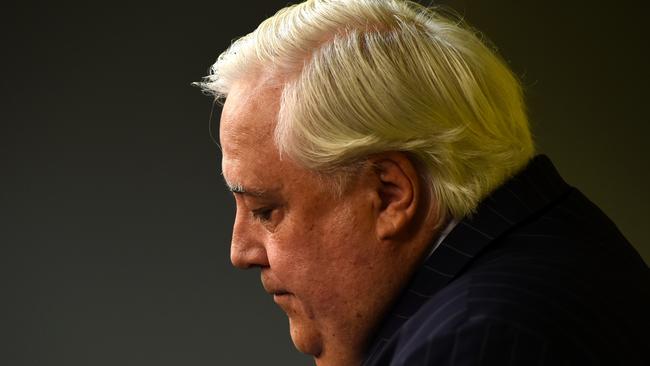Seismic debt that could destroy Clive Palmer
The unpaid bill from a seismic firm has left Palmer’s ‘cash box’ exposed.

Clive Palmer made a prediction before the September 2013 federal election that was jaw-dropping even by his exuberant standards.
Voters in the Sunshine Coast seat of Fairfax already knew their candidate purported to be fabulously wealthy. He spoke openly of the origins of his wealth; it was a large part of the electoral appeal. From Gold Coast real estate agent and property developer to self-proclaimed billionaire with valuable iron ore tenements in Western Australia, Palmer’s story held enduring public and media interest.
But a fortnight before Australians went to the polls, his curriculum vitae became more fabulous. He was, he declared, the country’s newest oil and gas magnate.
He told Australians his company, Palmer Petroleum Pty Ltd, had spent more than $50 million on a major program of 3D seismic surveys in the Gulf of Papua, west of Port Moresby — hitting the jackpot with a gas field shaping up as massive. For the soon-to-be-elected politician and his company, Palmer Petroleum (former Chinampa Exploration Pty Ltd), it was a stunning feat.
“The asset could be worth in excess of $US35 billion and is potentially one of the world’s largest gas fields,’’ Palmer said.
“The results of the studies are extremely favourable and show this new Papua New Guinea gas region could possibly be as significant a resource area as the North West Shelf in WA.”
He described how Palmer Petroleum, with its 100 per cent interest in the offshore exploration licence, had commissioned the 3D surveys over more than 3000 sq km. The PNG government was so impressed it had offered Palmer Petroleum “strong support to help take the Gulf of Papua gas project forward”.
“The world is hungry at the moment for gas for environmental reasons,’’ he added. “There is huge demand from China and the rest of Asia and it could also help meet Australia’s future energy needs.”
In an earlier interview with the ABC’s Australian Story, he said: “If you look at companies that have got that sort of gas and oil interests in the United States, they’re capitalised on about $60 billion. That’s one of our best-known stories. We’re now in negotiations with Exxon and other people to develop that and to do a $16 to $17 billion LNG project and that’s going ahead.”
Behind closed doors and in terse legal letters, it seems a very different story was playing out at the same time. It continues to this day. It is less prominent or visible than Palmer’s other financial and corporate dilemmas. But it not only exposes the apparent hollowness of the claims about this being the next big oil and gas province. More worryingly for Palmer, it threatens to take from him the one extremely valuable asset in his faltering group of businesses — the mining rights for the iron ore tenements held by his company, Mineralogy, in Western Australia.
As Palmer was wringing maximum public benefit in late August 2013 with the oil and gas bonanza claims, the heads of a Singapore-based company were left wondering what on earth was going on.
Palmer had contracted the specialist seismic company, called BGP Geoexplorer Pte Ltd, two years earlier to perform the 3D surveying.
Their vessels were equipped with sophisticated equipment and highly trained scientists and crews. The costs of commissioning the custom-built vessels for weeks on end of survey and analysis were high. In this sector, huge sums are spent searching for telltale signs of economic reserves of oil and gas. The world’s leading companies commit after careful analysis of risk-versus-reward. It is a fast way to burn huge lumps of cash for an amateur like Palmer Petroleum.
Palmer wanted the seabed comprehensively examined by the experts in marine seismic. He also required a technical interpretation of the survey data. In a deed signed in 2011, he agreed to invoices totalling $U35 million.
But when he had received the results of their work, he was “disappointed with the results and interpretation provided by (the Singaporean company) because the amount of gas recorded was low and the report did not contain any interpretation or conclusions regarding other petroleum products”, Palmer told the Supreme Court in Brisbane in a sworn affidavit two months ago.
Unhappily for the Singaporeans, Palmer then refused to pay their invoices. Palmer told the court early this year that he became “suspicious and troubled”. He said he got another expert report, a desktop review of the Singaporean data, claiming it was very positive. The Australian has been told it was little different.
Palmer’s legal defence for not paying was that he suspected the Singaporean company had deliberately understated the potential resource beneath the seabed because, he suggested, the company wanted to take the resource for itself “and the government of China”.
“My suspicions were based on the content of discussions I had with representatives (of the Singaporean company) on a number of occasions, the exact dates of which I cannot presently recall,’’ he said.
The legal paper-trail shows that on June 18, 2013, one of Palmer’s employees, Raymond Tam, wrote to the Singaporean company in blunt terms: “Palmer Petroleum has serious questions over the interpretation of the data and the professionalism and techniques used in carrying out this work. Palmer Petroleum does not recognise any obligation to make any further payments to your group as a consequence of your group’s performance of its contract and hold your company liable for specific performance and / or damages.”
If Palmer had wanted to pay, however, he was already severely hamstrung. His companies were in dire financial straits. On June 17, 2013, the day before Tam’s rejection note, The Australian had revealed the contents of a leaked and highly sensitive legal letter, from March 2013. In it, Palmer warned that the jobs of over 1000 employees of his group and companies depended on an urgent $200m payment from Citic Pacific, which was mining his iron ore tenements.
By late 2015 with $US16.72 million still owed by Palmer to the Singaporeans, their patience had been severely tested. Their many efforts to have meetings with Palmer and his staff were being repeatedly stymied. Their lawyers in Singapore accused Palmer’s staff of deliberately delaying, obfuscating, and even fabricating a document in a bid to avoid payment. Finally, a statutory demand was issued four months ago, resulting in a legal action by Palmer to set it aside.
On March 4, Supreme Court Justice David Boddice characterised as “a merely spurious claim, bluster or assertion” Palmer’s arguments that the work of the Singaporeans was defective. Boddice rejected Palmer’s arguments, giving the Singaporeans a pathway to be paid.
And this is where the unpaid invoice from the Singaporeans for surveying a seabed, which was littered with molluscs but held little in the way of oil and gas, threatens to part Palmer from his real asset — the iron ore tenements held by Mineralogy Pty Ltd.
When Palmer first signed up the Singaporeans to work for Palmer Petroleum, he issued a guarantee for the debt as a director of Mineralogy Pty Ltd. It may turn out to be a very costly mistake.
In Palmer’s tumultuous corporate life there has been one imperative.
It is the protection of his flagship company, Mineralogy, and its valuable assets — mining rights and site lease agreements for iron ore tenements in Western Australia’s Pilbara region.
His two more prominent businesses — the Coolum resort, which never made any real money for Palmer, and the Queensland Nickel refinery, which made money briefly and was then aggressively stripped of tens of millions of dollars — collapsed because of their unviability and debt.
The resulting loss on the Sunshine Coast and in Townsville of about 1500 jobs (some 700 at the resort and 800 at the refinery); the current failure to pay entitlements owed to sacked refinery staff, totalling $73m; the debt due now to unsecured creditors of $100m; the looming environmental clean-up costs at a contaminated site of up to $300m — these are all heavy burdens for those directly affected, and for the public purse. It is, says the federal member for Fairfax, “very sad”.
But throughout the corporate carnage and Queensland Nickel’s inevitable liquidation, Mineralogy Pty Ltd, has stood separate, unscathed and unburdened by voluntary administrators and creditors.
While Palmer holds all of the issued share capital in Mineralogy through other wholly owned companies, Mineralogy is not legally tied to the other company failures in his group.
This means that for as long as it remains a going concern and pays its bills, Mineralogy’s iron ore tenements are safe.
The tenements are Palmer’s pathway from ruin. The tenements are his financial past, present and future — because when, or if, he agrees on a calculation of royalties, payable to Mineralogy, for the iron ore that is being mined and shipped to China by the Chinese government-owned Citic Pacific (which has spent $10bn building its project), the tycoon who looks financially busted now will again be very wealthy.
As his then financial head, Daren Wolfe, said in a Supreme Court affidavit in Perth last November, Palmer’s expectations prior to his ongoing royalty dispute with Citic Pacific were that Mineralogy would be receiving “very substantial royalties, in the order of $400m per annum … from about March 2013”.
Mineralogy was to have been Palmer’s spectacular cash box. Wolfe described it this way: “Mineralogy does not conduct any operational business. Mineralogy’s major revenue-producing asset is the mining tenements that are subject to the (mining rights), upon which it is relying for cash flow.”
But as the Singaporean seismic company, BGP Geoexplorer Pte Ltd, and their lawyers pursue the $US16.72m that is owed by Palmer, Mineralogy is now vulnerable. The guarantee he signed as a director is its weakness.
This slow-burning but potentially devastating legal action is being watched closely in Perth, Beijing, Singapore, Canberra and Brisbane. The rights of Mineralogy in the iron ore tenements are set out in the WA government’s State Agreement, a special piece of legislation signed by Colin Barnett as a minister before he became premier. Barnett has not tried to disguise his view of Palmer. Senior sources close to the premier’s office reveal that the WA government believes the state and the mining company, Citic Pacific, would be much better off if Palmer was out of the tenements.
“Clive has damaged our relationship with China,” Barnett said two years ago when Palmer was causing fewer problems.
“I spend a lot of my time as Premier ensuring that that damage is kept to an absolute minimum. To put it bluntly, the Chinese hate Clive Palmer. In their view, and I think they are right, he’s taking unfair advantage of an agreement ... and he is trying to get more money out of them than was originally negotiated.”
But if Mineralogy becomes insolvent because it cannot pay a debt that its then director, Palmer, guaranteed to the Singaporeans for their seismic work on oil and gas reserves off PNG, all bets are off. In the event of Mineralogy being liquidated, it would be removed from the State Agreement. Its tenements, Palmer’s most lucrative asset, would be prised from his grasp.



